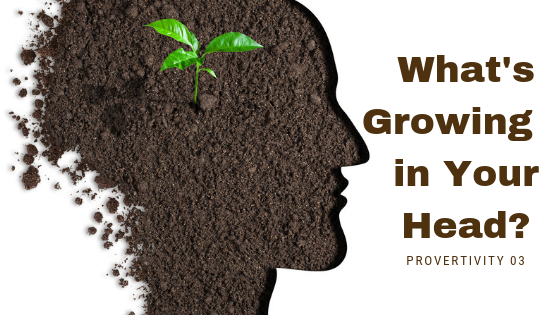
What’s Growing in Your Head? "Knowledge is like a garden: If it is not cultivated, it cannot be harvested." - African Proverb
When I was a kid, my family had a large garden down on my uncle Bob’s property. We would go there on a regular basis to tend to the garden. My most vivid memories are of the times we would go to gather or reap the harvest, picking the ripe vegetables off the vines, digging up the potatoes from the earth and, one of my favorites, breaking off and eating stalks of rhubarb.
What I don’t remember as well is going to the garden to till the soil, plant the seeds or fertilize the crop. However, even though I can’t recall it, it still happened. My mom and dad planted green beans, and green beans grew. They planted tomatoes, and tomatoes grew. The proof of what was sown into the ground was the fruit of what was reaped from the garden.
Our proverb teaches this same principle. If you and I don’t make efforts to acquire knowledge, then we can not expect to have it, and if we don’t put the knowledge we have to use, we shouldn’t expect to gain anything from it. We have to till, plant and fertilize the garden of knowledge to experience the fruit of it in our lives. And like the garden of my childhood, this is a continual process of tilling, planting, fertilizing, and reaping.
It is widely taught that the discipline of learning separates great leaders from the rest. In Disrupt You!: Master Personal Transformation, Seize Opportunity and Thrive in the Era of Endless Innovation, author Jay Samit proposes that in the 21st century, lifelong learning is no longer a luxury but a necessity for employment. Being a
Leaning keeps your mind young:
The brain is a muscle and learning exercises the muscle to keep it growing and vibrant. There have been studies that show reading keeps your mind active, preventing it from becoming weak and unhealthy. Mental stimulation (through learning) can affect the onset of dementia and Alzheimer’s disease. As John Maxwell says, “You are too old only when you stop learning and improving.”
One of the secrets to staying young is always to do things you don’t know how to do, to keep learning. ~ Ruth Reichl
Learning increases creativity:
Creativity at its core is
Learning keeps you ready for the future:
Let’s face it, the skills and training that are needed in the years to come are most certainly going to be different than what is required today. David Russell Schilling, in a 2013 article references the “Knowledge Doubling Curve” which shows that until 1900 human knowledge doubled approximately every century. By the end of World War II, knowledge was doubling every 25 years. He states that as of 2013, on average human knowledge was doubling every 13 months. With the advancement of the internet and globalization, it could lead to the doubling of knowledge every 12 hours. What you know today will not be enough tomorrow.
One of the things that limit our learning is our belief that we already know something. ~ L. David Marquet
So we have established that being a
Learning through Experiences (Failure)
Everything we experience, the highs and lows, the win and losses, successes and failures are opportunities to learn and grow. When you keep this mindset, you can treat failure as a learning experience. Thomas Edison did not fail over 10,000 times at creating the light bulb, he “just found 10,000 ways that won’t work.”
Tim Irwin, Ph.D. in his book Run With the Bulls Without Getting Trampled: The Qualities — You Need to Stay Out of Harm’s Way and Thrive at Work (I highly recommend) teaches that one the Critical Success Factors is the Ability to Learn. Irwin presents three principles of learning from experience: One, examine past situations to determine what worked and what did not. Two, identify the causes for why specific strategies worked or did not. Three, determine whether or not the lessons may apply to an audience broader than just oneself.
Remember, everyone makes mistakes, even the most successful. The key is not making the same mistake twice, learning and growing and becoming a better person because of them. If you don’t honestly evaluate your mistakes, you risk repeating the same mistakes and not learning from them.
The worst thing that could happen to you today could lead to the best thing that happens tomorrow. ~ John Maxwell
Learning Through
Scottish poet Robert Buchanan wrote, “O would some power the giftie gie us, to see oursels as others see us.” Simply translated, “If only we had the power to see ourselves in the same way that others see us.” Aristotle taught, “Knowing yourself is the beginning of all wisdom.” If you want to develop and grow as a leader, then there needs to be a passionate pursuit of understanding yourself; the good, the bad and the embarrassing. You need to be aware of your strengths and weakness and how to lessen the impact of the weaknesses and leverage the strengths.
Nearly twenty years ago, my good friend and pastor Todd Mullins gave me great advice. He told me, the way people perceive me is their reality of me. Even if it is not entirely true of who I am. That set me on a course to understand and be aware of my blind spots. Blind spots are the tendencies in ourselves, that we are not aware of.
I am a huge proponent that assessments are powerful for
A second way to learn through
Here is a question that you can ask those that you trust. “If you see me doing anything that would drive my life, family or organization off a cliff can I trust you to tell me way in advance before it destroys me?”
It takes humility to seek feedback. It takes wisdom to understand it, analyze it and appropriately act on it. ~ Stephen Covey
Learning Through Resources
Today is a great time to be a learner. There is an unlimited supply of resources from which to learn. With the advent of Amazon, Barnes and Noble, Kindle and Audible, there is instant access to books on any and every subject. Numerous sites offer summaries of books, giving the most important content. The internet provides immediate access to teachings from some of the greatest teachers and thinkers. Now it is even possible to get an entire college education without ever stepping foot on a college campus. However, these resources have to be used to be of any benefit.
I want to challenge you to continually learn and improve in your chosen field. Brian Tracy, in his book The 21 Success Secrets of
1. Spending at least 30 to 60 minutes a day reading in your field.
(Check out my post IF I KNEW THEN WHAT I KNOW KNOW where I give multiple benefits of having a consistent discipline of reading.)
2. Listening to audio programs in your car, so you learn on the road. (#drivetimeuniversity)
3. Attending as many courses and seminars in your field as possible.
So, if you want to harvest knowledge you have to garden your mind. Learning through failure,
Eliminate Excuses
Sean Stephenson in his book Get Off Your “But”: How to End
Stay Curious
Michael Hyatt wrote, “Curiosity is vital for leaders because learning is vital for leaders. I’m constantly reading, experimenting, and playing with new ideas and fresh approaches. Without curiosity, my leadership would have stagnated decades ago. Without the habit of curiosity, yours will too.”
Teach What You Learn
I have found that the best way to continue growing is by teaching what I have learned. Teaching cements learning through action. No, you don’t have to gather a class of students to teach, it could be as simple as sharing your learnings with a friend or with a team that you lead.
I hope you have found this helpful. If so, please share it with your friends and family. I would love to hear your comments and feedback. Until next time, live intentionally, lead effectively and last by continuing to increase your leadership longevity.
[et_bloom_inline optin_id=”optin_3″]
